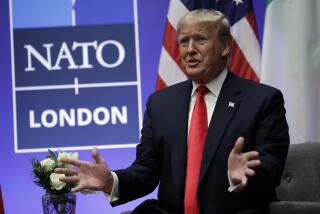Kemp Calls Proposed Arms Treaty ‘a Nuclear Munich’
- Share via
WASHINGTON — Republican presidential candidate Jack Kemp, escalating his criticism of the Reagan Administration’s arms control efforts, Friday called the proposed treaty to limit intermediate-range nuclear forces in Europe “a nuclear Munich” and said it could “imperil NATO’s future.”
The New York congressman, addressing the conservative Heritage Foundation, did not mention President Reagan by name as he likened the treaty now under negotiation at Geneva to the infamous 1938 British-French accord with Germany that unsuccessfully attempted to appease Adolf Hitler. But he sharply discounted the concept of nuclear disarmament that Reagan has made a prime long-range goal.
“Too many in this Administration have taken the easy way out of overselling arms control and fostering false hopes about the eventual abolition of nuclear weapons,” Kemp said. “And Europeans have indulged in pro-arms control rhetoric to appease peace movements.”
‘Should Know Better’
Kemp said the Administration “should know better” than to trust the Soviets’ expressions of interest in a mutual arms reduction.
“If (Soviet leader Mikhail S.) Gorbachev truly were sincere about reducing international tensions . . . then we should see this change reflected in Soviet foreign policy. Instead, Soviet aggression continues. Soviet espionage has become more brazen and Soviet terrorism and subversion more widespread,” he said.
Kemp, who is attempting to solidify his support among conservatives in a race that will also include more moderate challengers, Sen. Bob Dole (R-Kan.) and Vice President George Bush, contended that the Soviets’ objective remains to kill Reagan’s Strategic Defense Initiative.
At the Reykjavik summit last fall, he said, Reagan “courageously and rightly said no” to a Soviet effort to preserve “a monopoly on defenses against strategic ballistic missiles.” But he suggested that the extinction of the “Star Wars” program could result from an intermediate-range missile pact acceptable to Moscow.
Soviet ‘Fallback Options’
Kemp argued that, even if the Soviet Union dismantled its intermediate nuclear forces, “the threat to Europe would be little changed” because Moscow has “fallback options not available to us.” He referred to the Soviets’ otherwise superior position, including greater conventional forces.
However, he said he realized that an agreement may be signed and therefore he laid out “four minimum conditions” for any pact:
--It must “provide for a true global zero in all INF forces,” meaning that classes of weapons barred to one superpower must be barred to the other and that a “loophole” in the pending draft that would permit each side to maintain 100 intermediate-range weapons outside Europe must be eliminated.
--It “must include verifiable and equal limits on short-range INF systems,” plus a NATO guarantee to deploy “compensatory” forces if the Soviet side violates the limits.
‘Effective Verification’
--It “must mandate effective verification, including on-site inspection of suspect sites on demand.”
--It “must establish a timetable” for the destruction of deployed INF systems that will equalize force levels “before we irrevocably begin destroying our few launchers.” Even if these conditions are met--which seems improbable unless Moscow alters its bargaining stance--Kemp said the United States must be mindful of the potential consequences.
“If we sign a new INF treaty, we will be issuing a warrant of respectability for Gorbachev. We will be helping the Soviets hide behind arms control while they are embarked on aggression throughout the world.”
More to Read
Get the L.A. Times Politics newsletter
Deeply reported insights into legislation, politics and policy from Sacramento, Washington and beyond. In your inbox twice per week.
You may occasionally receive promotional content from the Los Angeles Times.










